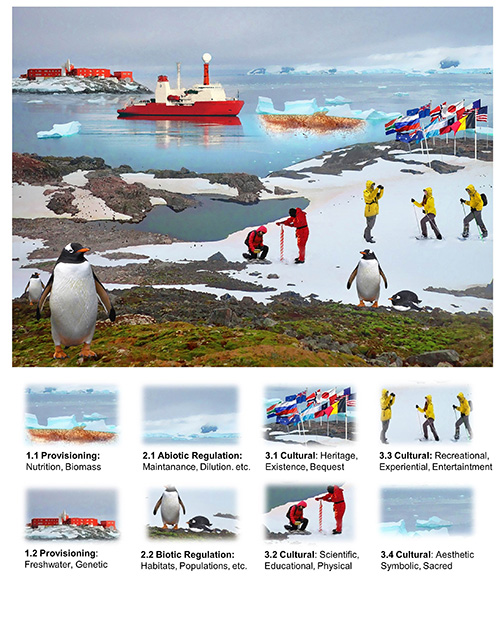A new publication, titled “Ecosystem services in Antarctica: Global assessment of the current state, future challenges and managing opportunities“, has been published in Ecosystem Services.
The publication examines different ecosystem services in Antarctica, including climate regulation, cultural values and living resources. It includes data from three meteorological stations located on the western side of the Antarctic Peninsula, which were retrieved from the SCAR Met-READER repository. You can access the publication here.
Abstract:
Antarctic ecosystem services are rich and diverse and include global climate modulation, biodiversity and habitat protection, cultural heritage, scientific knowledge, education and recreation as well as the extraction of marine living resources. However, environmental protection studies have rarely examined the full complement of Antarctic values recognized in the Antarctic Treaty or Antarctica’s other natural benefits as ecosystem services (ES). Moreover, the existing limited number of ES studies have focused primarily on the biophysical modeling of the service providing units, with little focus on evaluating the balance between Antarctica’s intrinsic vs. economic values (e.g., opportunity cost, payment for services and bequest), or societal perceptions on the Antarctic ES teleconnections with global issues. Here, we systematically identify the ES dimensions present in Antarctica through an expert elicitation combined with scientific literature review. We then map their spatial overlap and examine the existing trends of usage over the various stages of ES utilization in the continent. Lastly, we conduct a preliminary evaluation of the resulting trade-offs from their respective increased utilization. Our results show that Antarcticás ES are currently facing substantial challenges to remain sustainable. In marine ecosystems, fish and krill stock provisioning may put at risk the maintenance of habitats and biodiversity regulation. In turn, cultural values centered around terrestrial ecosystems, face a three-way conflict between the increasing demand for tourism opportunities, the region’s rich and diverse scientific interests and the vast wilderness and bequest values. To appropriately conserve Antarctic ES for future generations, we discuss how different ES framework tools could be developed and adapted to the Antarctic Treaty policy context.
Reference:
L.R. Pertierra, F. Santos-Martin, K.A. Hughes, C. Avila, J.O. Caceres, D. De Filippo, S. Gonzalez, S.M. Grant, H. Lynch, C. Marina-Montes, A. Quesada, P. Tejedo, T. Tin, J. Benayas (2021). “Ecosystem services in Antarctica: Global assessment of the current state, future challenges and managing opportunities”, Ecosystem Services 49 (June 2021), doi: doi.org/10.1016/j.ecoser.2021.101299

